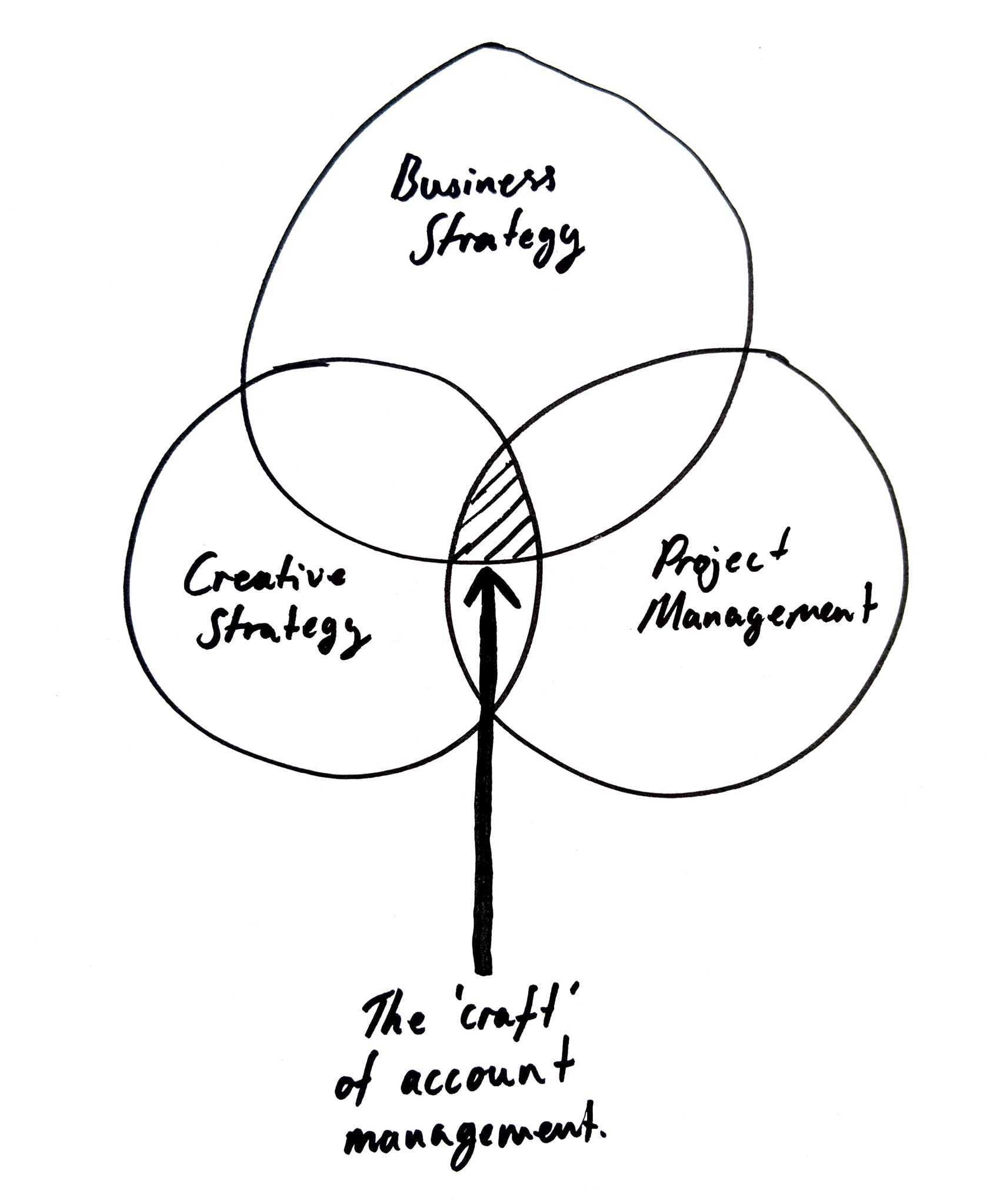In defence of the craft of account management*
*of the advertising variety.
I started my career as an account executive before grad programs became popular in the ad industry in Australia. Sure, there were a couple run by industry bodies but agencies themselves hadn’t bothered with their own yet. Common practice was to intern if you, like me, had nothing but a raft of casual jobs through high school & university to pair with your freshly minted graduate certificate. But I was lucky. A two week internship was enough to land an account executive role after an interstate phone call, an in person coffee, and the job offer came through the next week. But here’s what I was too ashamed to admit at the time - after a two week internship and a complete lack of a job description (thanks in part to the casual hiring process), I wasn’t entirely sure what account management entailed. You’d hear quips like “you’re the voice of the client in the creative process”, but it became evident how vaguely described the role of account management was. Don’t get me wrong, I was busy. I always had a multitude of tasks on the go at once, often madly running briefs, proofs, coffees, contact reports, job bags, and everything else across the agency. So was everyone else, but that doesn’t mean we could explain our job in 8 words or less to the average punter at the pub.
This became a recurring theme. Aside from the occasional list of unrealistic expectations that HR would flash at you if you asked for a promotion, people couldn’t provide a consistent, concise explanation of the role at its core. I realised that the role of account management has changed over time, and will most likely continue to evolve. But here in lies the problem. And this is the problem that kept me up at night when I was an account manager:
Account management feels like it has no craft. Or at least, not one that is clearly defined and widely publicised.
Too often I would finish off the slogfest that was pulling together a brand campaign for a major international brand and the props would be directed towards the creatives, the director and production teams, and the strategist (if they were lucky). And I realised it’s because each of these areas have a craft. They make something and they can claim that they made it. Obviously the account manager(s) were right there in the trenches with them throughout the process but what were they doing exactly from the outsider’s perspective? Were they the ‘the people person’ who manages the balance between client, creative, and production expectations? Were they the highly organised puppet master and that, in itself, is something to be proud of? Deep down, personally it didn’t feel clear, and that’s why I felt hollow at a time when I should have been cracking the champagne, before being thrust into the next big brief with the only reward seemingly more revenue for the agency.
So how would I define the ‘craft’ of an account manager? There have been vague or metaphorical descriptions before. And there’s no doubt that the role is crucial to a functional agency, I once even went so far as to say that they are ‘the life blood’ of an agency. During my time at Ogilvy, the managing partner of the Melbourne office once described the account manager role as the ‘expert generalist’ - that a true account manager should have a level of skill and/or understanding in each facet of the business (strategy, creative, production, finance, client). But that didn’t sit right with me at the time. It’s not ownable because it’s general in nature. Craft is specific. We know account managers perform a specific function, we shouldn’t water their role down in generalisations and soft skills simply because their remit spans the entire creative process. Where are the hard skills upon which they can hang their hat?
Let’s break it down and get specific. In my mind, the ‘craft’ of account management sits at the intersection of three key areas:
Business Strategy: Anyone can generate a cost estimate but seeing opportunities for account growth, thinking about pipeline, and making calls on profitable resourcing are all essential elements of the commercial acumen of an account manager.
Project Management: Going beyond just being ‘organised’ to ensuring the right balance of the holy triangle of Time x Scope x Budget is met so as not to impact on the quality of the work, as well as negotiating with clients, creatives, and producers alike.
Creative Strategy: Sure, most projects will feature a strategist or planner but strategy isn’t written in the dark. A good account manager will write their own briefs often (adhering to the principles of creative strategy) and be able to shape the creative and production decisions accordingly.
I know what you’re thinking - Josh aren’t you being general again by combing three different areas? To some extent I am, but we have to acknowledge this role truly is a hybrid and, more importantly, I’m providing a bullseye for which to aim for through understanding the key ‘hard skills’ that culminate in the craft of an account manager. These are areas for an aspiring account director to work on, and importantly, areas you can hang your hat in order to be proud of what you do.
(or, you can be like me and decide you want to specialise in a specific area and become a strategist. But that bit is up to you.)

